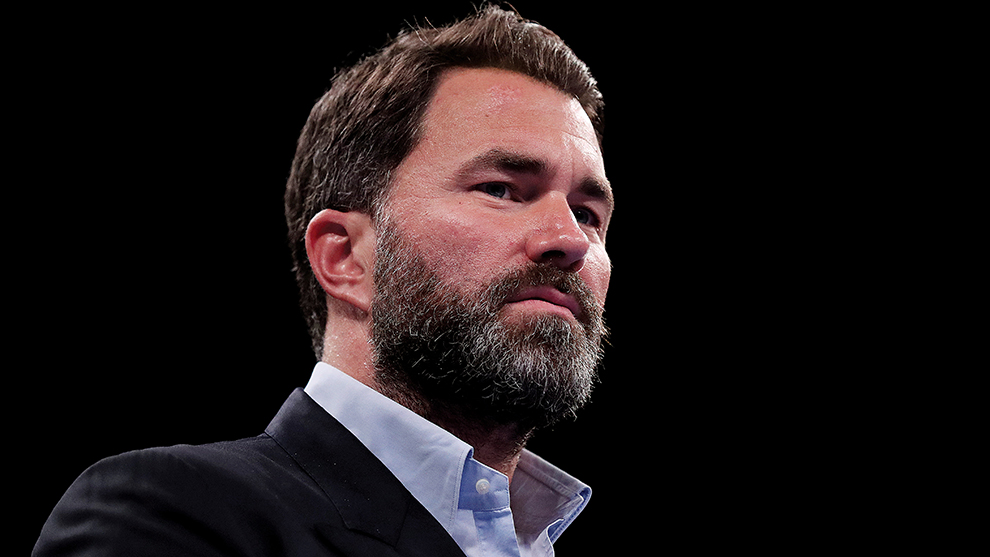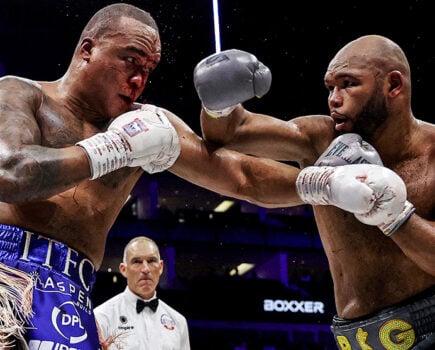IT MAY seem unfair that both Conor Benn and Eddie Hearn are the focal points of Thomas Hauser’s latest study into PEDs in boxing. Benn and Hearn, after all, are far from the only ones involved in a problem that’s just as prevalent today as it was several years ago when champions like Tyson Fury and Canelo Alvarez were caught out.
Prior to those two high-profile stars flunking tests, that came after several years of other multiple test failures, it seemed that boxing needed a fighter of significant magnitude to pop dirty so an example could be made of them. But Canelo’s six-month suspension was deemed lenient and Fury’s backdated two-year ban, that came after a period of time in which Tyson was not in any fit state to fight, did not convey the message required. Today, the sense that the most influential will always escape real punishment remains.
At the time of this writing, Benn will compete this weekend on the Matchroom card in Florida – against the 32-3-3 (24) Mexican Rodolfo Orozco in a light-middleweight bout optimistically scheduled for 10 rounds. The fight was given the green light by the commissions in Florida and Texas (where Benn holds a licence) before the BBBofC confirmed that the British boxer is not suspended. It is not thought they approved this contest, however. The 26-year-old was required to pass a VADA test. The extent of that VADA testing is unknown.
Benn is yet to explain to a commission or governing body why banned substance clomifene was discovered in his body by two separate VADA tests last year. Had he done so before now, there’s every possibility that Benn would be fighting without the cloud of controversy hanging over his head. Sure, he’d struggle to shift the stink of failing tests – that smell never really goes away – but at least he’d have served his time (or be close to doing so), and, as the cases of Alvarez and Fury prove, it wouldn’t have been long before the majority completely forgot any notion that he might have been a cheat.
That’s not to say he is or was a cheat. It’s merely the impression many currently have because they have not heard Benn’s reasoning for those failures. The WBC, a sanctioning body who rank fighters, last year ruled it might have been consumption of eggs that caused the first failed test. Benn rejected that, stating his defence did not mention eggs. He was later provisionally suspended by UKAD before that was lifted in July 2023 due to a loophole discovered by his legal team that forced the National Anti-Doping Panel to accept, under the current wording of rules and regulations, that failed VADA tests could not be considered in this case. And Benn, don’t forget, passed at least one UKAD test during the time period in which he failed two with VADA.
Consequently, Benn hasn’t yet been made to explain why two tests, conducted by an agency regarded as the best in the world at detecting PEDs, twice found the same testosterone-boosting substance in his body. That isn’t Benn’s fault, however. His legal team did their job. That they were able to do so, without any reasons for those failed tests being offered, speaks of a huge problem in boxing.
The ongoing confusion has done nothing for Benn’s reputation. He has found himself villainised. Plenty have jumped to conclusions about his guilt while he’s always claimed his innocence. That this case still drags on can largely be explained by his unwillingness to admit any wrongdoing, even just accidental ingestion. In some ways, that’s to be admired.
The boxer may well be able to explain the cause of the failed tests if he’s given the chance to do so, however. The no fault or negligence rule is important to consider and might play a part in his defence if he’s ever called to make one. Victor Conte, a controversial figure due to his proven involvement in supplying PEDs to athletes at the start of the century, is today regarded as one of the most knowledgeable figures on the subject. He claims to now dedicate his life to promoting a clean sport. “If you can show those who are carrying out the judication where it [banned substance] came from, and that there was no intent to cheat, then there’s no fault or negligence and that mitigates any potential punishment,” Conte told Boxing News. “Figure out where you got it from. If you got it from eggs, go buy those eggs and have them tested. If you got it from a supplement somewhere, gather those supplements and have them tested.
“My advice to anyone who wants to mitigate this and get it over with as quickly as you can, and you’re dealing with strict liability, figure out where it came from. Where did you get it? That’s your responsibility. You’re responsible for what you put in your own body.”
As is clear from Hauser’s study, education on PEDs is sorely lacking throughout boxing; from those in authority to the fighters to the media. The notion of ‘trace’ amounts, for example, and tests being passed and failed within days of each other are often referenced as a reason why athletes must be innocent. Trace amount, and the wording around it, insinuates it’s such a small amount it either couldn’t possibly have been used to gain an advantage or it entered a system in error. In many cases, however, micro-dosing can be the reason behind the mixed results.
“Normally when you do testosterone you do 200mg every two weeks,” Conte explained. “So, you don’t go outside that, you divide that 200mg by 14 days so now you’re micro-dosing. You’re doing a smaller dosage on a daily basis, instead of doing it once a week or once every two weeks. You do it every day, but a much smaller amount. Secondly, it also means there’s a strategy about when you take it. So, when you fill out a whereabouts form with the anti-doping entity, and you say you’re going to be at the gym from 9 o’clock until 10 o’clock in the morning, that’s typically when they’re going to come. After they come, or they don’t come, that’s when you do the injection.
“A lot of the drug use occurs at night, during sleep. That’s when healing, regeneration, tissue repair is maximised. They might take it at 8 o’clock at night, it will peak at 2 in the morning. By the time they wake up in the morning you’re below the [legal level].”
This is why VADA make a habit of turning up at athletes’ homes at night. In essence, if the ruling of the National Anti-Doping Panel is upheld, and VADA tests are to be discounted in this country, it changes everything. It makes the WBC’s Clean Boxing Program, which relies on VADA testing, redundant for British boxers. It means that any additional testing carried out on British boxers is a waste of time and money. It means more athletes using PEDs will not be detected.
It’s why both UKAD and the BBBofC feel it so important to appeal the National Anti-Doping Panel’s decision on Benn.
“They said they’re going to appeal but, as such, I don’t think a lot has really happened at the minute,” Tony Sims, Benn’s trainer, told BN. “[Benn] can fight. The National Anti-Doping [Panel] lifted his ban so he can fight. Whether the Board and UKAD appeal, we’ll see.
“I think they can keep postponing the appeal, but we’re not going to wait around. In the meantime, we’re going to get busy and do what he does best, and that’s get in the ring and fight.
“He’s been through two different processes, against VADA and the WBC, and the UKAD one. His ban has been lifted. To me, that’s the end of it and he’s going to fight now… Conor just wants to get on with his career and fight. He’s a fighter.”
Boxing News understands that the appeal will go ahead.
Hearn, meanwhile, has changed his tune dramatically in recent months. He’s on the front foot, demanding that every promoter pay for VADA tests. But why is he doing that while at the same time facilitating Benn’s return? It’s a massive contradiction from arguably the most influential promoter in boxing.
The Conor Benn case long ago ceased to be about one man’s innocence or guilt. It’s become a symbol of the chaos behind the scenes, of the strings that can be pulled and the lawlessness that must be addressed, not ignored.






